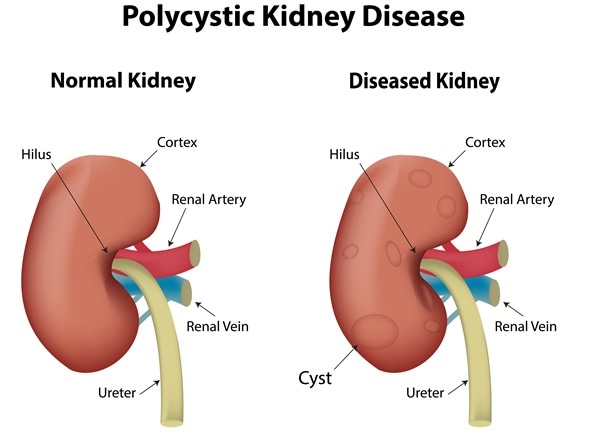A kidney cyst is a swollen, round, fluid-filled sac that develops on one or both of the kidneys. These cysts can be associated with serious conditions that affect the kidney’s ability to function, but usually they do not tend to cause complications and are referred to as simple kidney cysts.
Simple kidney cysts differ from the ones that develop when a person has the genetic condition polycystic kidney disease (PKD). Simple cysts do not enlarge the kidneys, change their structure or reduce their function, as is the case in people with PKD.

Poly cystic Kidney Disease - Image Copyright: joshya / Shutterstock
Simple Kidney Cysts
It is not fully understood what causes simple kidney cysts, although it is thought that obstruction of the tiny tubules within kidneys may be the cause and a deficient supply of blood to the kidney is suspected to play a role. Also, sacs that form on the tubules, referred to as diverticula, may detach from the tubule and become simple cysts.
Whether or not genetics plays a role in the formation of these cysts has not yet been studied.
Simple kidney cysts do not usually cause symptoms, damage to the kidney, or impair its function. However, if a cyst becomes large enough, it may cause pain between the ribs and hips and press on other organs. Sometimes, the cyst can become infected, in which case a person may develop a fever, as well as pain.
A simple cyst that is causing pain or obstructing urine or blood flow through the kidney may need to be treated. A procedure called sclerotherapy is used, where the cyst is punctured with a long, thin needle and drained.
For cysts that have become very large, a procedure called laparoscopy may be performed, where a surgeon drains and removes the cyst under the guidance of a fibre-optic instrument that helps view the cyst.
PKD
PKD is a genetic condition characterized by the formation of numerous cysts on the kidneys. These cysts can cause significant enlargement of the kidneys and distort their normal structure, giving rise to chronic kidney disease and impaired kidney function. This condition can even lead to kidney failure.
The cysts seen in PKD can also cause high blood pressure, vascular problems in the brain and heart, and liver cysts.
PKD is caused by a gene mutation, which is usually inherited. The remaining cases are caused by a spontaneous gene mutation, where neither parent is a carrier of the mutation. Three different mutations have been discovered that are associated with PKD. These mutations affect proteins that are required for normal kidney development.
There are two forms of PKD: autosomal dominant PKD (ADPKD) and autosomal recessive (ARPKD). These are described in more detail below.
ADPKD
This is the most common type of inherited kidney disease, affecting about 12.5 million individuals worldwide. Cysts filled with a watery fluid form, proliferate and grow in both of the kidneys and often also in the liver and pancreas. Over time, the cysts eventually replace healthy tissue and cause loss of kidney function. Common symptoms include pain in the back and/or abdomen, hematuria, recurrent urinary tract infection, kidney stones, and kidney failure.
This condition is inherited in a “dominant” fashion, which means that there is a 50% chance that an affected parent will pass the condition on to each child they have.
ARPKD
This is a rare condition that occurs in around 1 in every 20,000 newborns. Around one in three babies born with this condition die within the first four weeks of their lives. Fluid-filled sacs form in the tubules of both kidneys and in the liver. Eventually, the cysts cause scarring or fibrosis that replaces the healthy tissue in these organs. If the fibrosis is severe enough, it can lead to kidney and liver failure. ARPKD is inherited in a “recessive” manner, that is, if both parents are carriers of this condition, there is a 25% chance that each of their children will be affected.
Further Reading
Last Updated: Dec 30, 2022